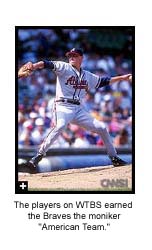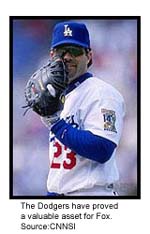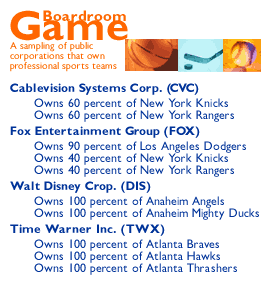|
Companies having a ball
|
 |
March 1, 2000: 6:20 a.m. ET
Corporate ownership of sports teams expected to increase, but dangers loom
By Staff Writer Tom Johnson
|
NEW YORK (CNNfn) - Last fall, when Walt Disney Co.'s stock wallowed near its 52-week low, investors immediately began scouring for signs of dead weight.
The first thing they settled upon was seemingly the most obvious mismatch in the company's diversified book of business: Disney's two professional sports franchises, the Anaheim Mighty Ducks hockey team and Anaheim Angels baseball club.
Ultimately, Disney's bottom line and stock price both rebounded, muffling investors' clamor to divest the teams. But the situation highlighted the sometimes precarious, but increasingly necessary, relationship between revenue-hungry professional sports leagues and deep-pocketed public corporations.
"The fact remains that the cost of admission -- that is the value of these franchises -- has risen to such a degree that in most situations, the leagues have outgrown the family ownership situations," said Jerry Colangelo, part-owner and chief executive officer of baseball's Arizona Diamondbacks and basketball's Phoenix Suns. "My opinion is ... you are going to see a lot of large conglomerates participating in professional sports."
Leverage, not money, is king
It's a relationship that dates back to at least the 1950s, when beer magnate August Busch bought baseball's St. Louis Cardinals, envisioning the perfect platform on which to leverage his trademark Budweiser with the great American pastime.
The rationale behind the 2000 version of the relationship between professional sports associations and public companies is not much different. The ability to heighten brand awareness for one's product through sports entertainment remains the paramount consideration. Only now, the stakes are much higher for the leagues, companies and investors alike.
 "One still needs to have a reasonably good economic return, but at the end of the day the synergies can not be underestimated," said Pierre Boivin, president of the National Hockey League's Montreal Canadians, which are owned by Molson Co., one of Canada's largest brewers. "One still needs to have a reasonably good economic return, but at the end of the day the synergies can not be underestimated," said Pierre Boivin, president of the National Hockey League's Montreal Canadians, which are owned by Molson Co., one of Canada's largest brewers.
"It's really a pretty simple equation for us and that is the very direct relationship between sports fanatics and beer," he said. "It's not a surprise to anyone that sports marketing is a very, very important part of beer marketing."
Currently, public corporations own all or part of six National Basketball Association teams, eight National Hockey League teams and five Major League Baseball franchises. There currently is no corporate ownership of teams in the National Football League, the result of a long-standing rule requiring potential owners to make running a sports franchise their primary focus.
Not surprisingly, a majority of the corporate owners are large media conglomerates looking to leverage their franchises onto regional or even national cable networks -- a concept pioneered by cable television magnate Ted Turner, who purchased baseball's Atlanta Braves in 1976 and placed their games on his fledging superstation, WTBS.
 The exposure widened the Braves' fan base while raising WTBS' stature nationally, prompting Turner to leverage his assets even further by purchasing Atlanta's professional basketball team, the Hawks. The exposure widened the Braves' fan base while raising WTBS' stature nationally, prompting Turner to leverage his assets even further by purchasing Atlanta's professional basketball team, the Hawks.
Turner was later bought out by Time Warner Inc. (TWX: Research, Estimates), the parent company of CNNfn, which now also owns the Atlanta Thrashers, an expansion team in the National Hockey League.
Time Warner officials hold no false hopes of ever making money on the three teams. The current operational cost structure involved with running professional sports make that virtually impossible. But the synergies created between the teams and company, they say, are invaluable.
"Nowadays you don't make money on the running of the team," said Stan Kasten, who oversees all three teams for Time Warner. "But if you can combine it with other teams, if you have some other way to benefit from the access to the program, then it starts to make more sense."
One of the biggest benefits, analysts said, was having a seat at the owners' table, where league issues, such as television contracts, are hashed out behind closed doors.
"On the face of it, Fox [Entertainment Group's] ownership of the Los Angeles Dodgers is not an enormous success economically," said Christopher Dixon, an analyst with Paine Webber. "But when you take into account their broadcast of baseball games, it gives them a seat at the league's table, which is invaluable."
Appeal of sports broadcasting expected to grow
Fox (FOX: Research, Estimates) purchased the Dodgers in 1998 with exactly that idea in mind. In addition to acquiring one of the most prestigious names in Major League Baseball, Fox -- which currently holds a portion of the league's national television contract -- gained invaluable access to the league's owners.
"It's no secret that our company views sports television as valuable to our overall television strategy," said Jeff Shell, the president of Fox Sports. "Ownership of a team gets you in the door with that kind of programming and ensures you are going to be there long-term."
Like Kasten, Shell readily admits Fox holds no illusions about ever turning a significant profit on the Dodgers. But positioning itself to capitalize on Major League Baseball's growing popularity, both nationally and internationally, more than makes up for whatever financial loss it may incur.
 "No matter how you spend and what you invest, any company that is involved in the business of brand has to look at sports as part of their assets," he said. "No matter how you spend and what you invest, any company that is involved in the business of brand has to look at sports as part of their assets," he said.
Still, one of analysts' biggest concerns about such investments is the amount of time it detracts company officials from concentrating on the company's main lines of business, a main reason why Fox recently sold a minority stake in the Dodgers to former Warner Bros. studio chief Bob Daly, who will now handle the team's day-to-day operations.
"To the extent that ownership of these teams give you guaranteed programming that is reasonable, obviously it makes sense," said David Londoner, a media analyst with Schroder & Co. "The downside of it is it takes a lot of management time and you end up in some cases where you've got the CEO spending 20 percent of his time in the locker room and not in the board room."
Disney moved to protect its turf
That can represent a problem at a company such as Disney, where Chairman Michael Eisner -- ever aware of his company's brand image -- recently got deeply involved in the hiring of the Angels' new general manager. But Eisner's marriage to his sports franchises has always been one of necessity than love.
Disney launched the expansion Mighty Ducks in 1993 because Anaheim risked not having a major league team for the new arena it had just built. Then the company acquired the Angels in 1996 when it looked like an outside group might move the team elsewhere.

Losing the teams would significantly damage Anaheim's stature as a major league city, and thus potentially damaging the gate receipts at Disneyland across town. With the teams, Disney could effectively turn the city into a legitimate tourist destination that it at least partially controlled.
"Our purpose in owning the two teams was to make sure that Anaheim continued to be viewed as a professional, world-class city to help protect our investment," said John Dreyer, a company spokesman. "We don't make money on the Angels. The Ducks are barely profitable. But they are extremely important to the well-being of the Anaheim region."
Still, Disney hardly views the teams as critical to its long-term survival. So when Broadcom Corp. (BRCM: Research, Estimates) founder Henry Nicholas III expressed some interest in buying the teams last year, Disney officials were more than happy to listen.
But Nicholas, whose primary interest in the teams was acquiring the broadcast rights for potential Internet ventures, ran into an all too familiar problem during the negotiations: His shareholders hammered Broadcom's stock price.
Teams often come at a price
Certainly shareholders' concerns can be understood. After all, the list of corporate failures with professional sports team is equally as long as the successes. CBS Corp. (CBS: Research, Estimates), for example, took a loss on owning the New York Yankees franchise before selling it.
Many companies remain equally as wary today. AT&T Corp. subsidiary Liberty Media Group (LMG: Research, Estimates) pulled out of a $514 million agreement to purchase Ascent Entertainment Group (GOAL: Research, Estimates) after a deal to sell Ascent's two sports teams, the Denver Nuggets and Colorado Avalanche, fell apart.
Liberty Media revived the deal last week, but lowered the purchase price and offered only cash. Liberty Media officials also made it clear the sports teams were not in their long-term plans.
Still, most guess more public corporations will enter the sports business. The economics of the games demand it, and more companies will undoubtedly look for better ways to leverage their assets.
"It will continue the cycle; I think it has to," said Andrew Zimbalist, a professor of economics at Smith College and the author of several books on the business of sports. "It's positive to have serious corporations that have the business background to do that kind of work necessary to run teams today."
The danger, Zimbalist noted, is you risk allowing media conglomerates too much control over the game.
"The media power of these teams soars disproportionately," he said "They simply start to have more power than some would like to see."
Colangelo said the leagues are well aware of such dangers, and therefore will scrutinize a corporate application for ownership perhaps even more so than it would a private application.
"In today's world where everything is so convoluted ... you have to do incredible due diligence," he said. 
|
|
|
|
|
 |

|

